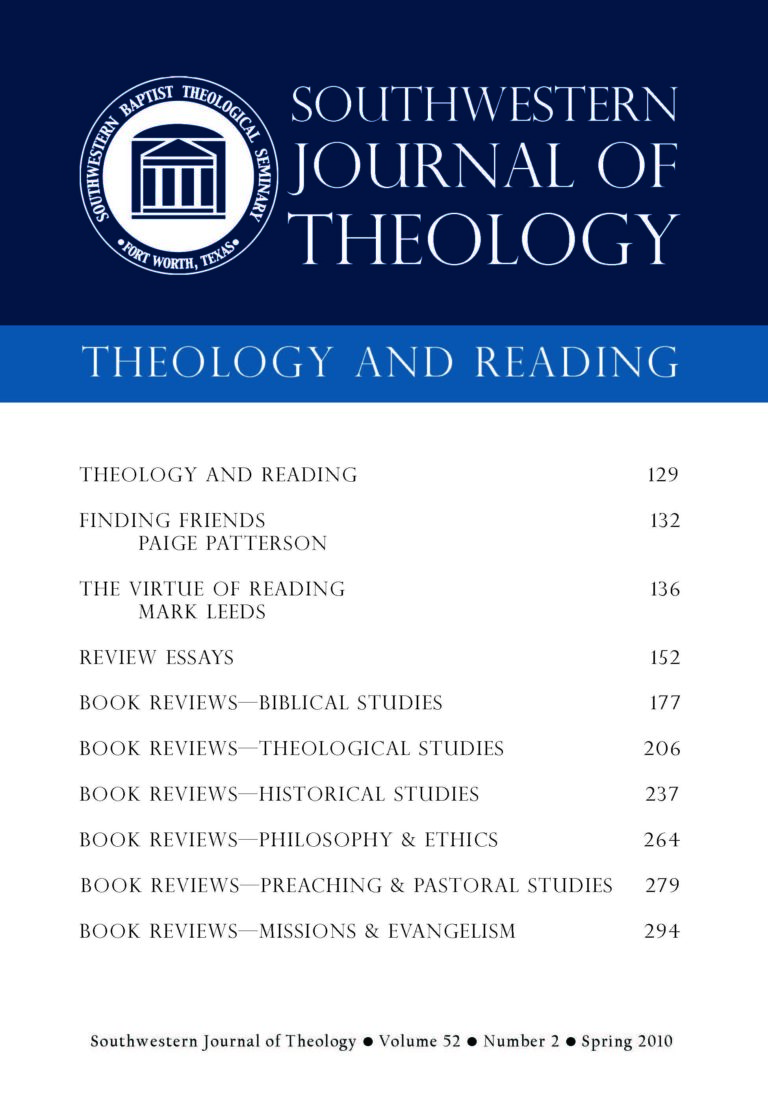
Theology and Reading
Southwestern Journal of Theology
Volume 52, No. 2 – Spring 2010
Managing Editor: Malcolm B. Yarnell III
By David S. Dockery. Nashville: B&H Academic: Nashville, 2007. 264 pages. Paperback, $19.99.
Dockery’s book is a short introduction to the difficult but critical task of the integration of learning and Christian faith. There are nine chapters and a bibliographical addendum devoted to explore and present the author’s convictions about what profile a Christian higher education institution should have. The whole book is written in an accessible style, meeting the goal of being a resource not just for scholars, but also for pastors, parents and college students. At the end of every section there is a short but substantive bibliography on the particular discussion. The book’s last section is a larger bibliography divided into various sections corresponding to the integration of faith and learning.
The basic outline of the book includes a discussion on the need for developing an awareness of the qualitative differences between Christian higher education and other options (ch. 1). At the basis of these differences, of course, lies a particular understanding of how the universe works and how we relate to it (chs. 2 and 3). To appropriate this type of Christian worldview we would need to pay close attention to our Christian tradition that emphasizes intellectual as well as moral and character formation (ch. 4). In chapter five, the Apostle Paul’s experience in Acts 17 is taken as a model for integrating faith and learning. According to Dockery, the apostle’s example leads us to affirm that “the challenge of integrating the Christian faith and all learning involves perception, appreciation, engagement, and then when necessary, confrontation—in that order” (113).
That superlative task, however, is not to be done in the “lone ranger style” so common in modern American academia. It has to be accomplished within a Christian scholarly environment that prioritizes community (ch. 6). Authentic community must be built with 12 “blocks” identified in Romans 12:9–21. Among these are Christ-like love, discernment, devotion to one another, enthusiasm, generosity, and humility—in other words, grace.
In chapter seven, Dockery elaborates on the characteristics that a gracefilled academic community should have. Reflecting on Romans 15, he identifies four distinctive marks that pertain to that type of community: a call to unity, a call to worship, a call to service, and a call to a shared life. Since “grace is the power with which men and women in academic contexts perform their gifted task . . . we need an apologetic confessional Christianity to be at the foundation of such a purposeful academic community” (159).
The last two content chapters (chs. 8 and 9) invite the reader to develop a theology of Christian higher education, and to gain awareness of the globalized world to which we have been called to serve. These are two chapters of interesting and substantially relevant insights, which any theologian and Christian educator would certainly appreciate. It is true that “our natural tendency is to build walls around ourselves and protect our world from outsiders” (194). It is also true that the Christians of the Global South are becoming “the majority players” (195), and that it is to this “browning of Christianity,” “this changing world that Christian Higher Education has been called to serve” (194). We should do that by assuming “a humble posture of listening to and learning from one another” (202). He concludes the book with a prayer for God to bless the future work of Christian higher education in this country and around the world (203).
Dockery’s book is enjoyable and instructive. It betrays the commitment and passion of the author for the theological and pedagogical endeavors. I found myself nodding affirmatively at many of its proposals and expectations. The last two chapters especially leave a good impression on my heart and mind for different reasons. I think Christian higher education needs to develop a more serious theology than the ones commonly available. I also think Christian higher education institutions in the United States need to develop an awareness of serving more than just English-speaking people. Instead of just educating other people into English, Christian educators also need to educate themselves into the “majority’s language” as well as others. The globalized world, which we serve, should not be identified only or mainly with problems or challenges we face (e.g., poverty, terrorism, war, revolution, despair, destruction and environmental challenges), but also with opportunities to learn from others. This is theologically sound and pedagogically needed. Christian higher education in the U.S. should stop seeing the world only in terms of a mission field. As Dockery points out, there is need to see it as a place from where we can learn, especially about the integration of faith and learning. For this very reason, Dockery’s book should not have been content with only providing English bibliographical support. It should have mentioned at least some of the major dialogue partners that Christian educators in the United States have in other contexts (e.g. Pablo Freire!). This would have helped the book to finish with a very vivid and realistic picture of what it means to work for a globalized world.





